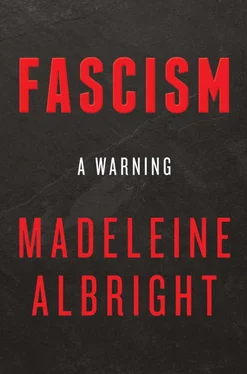THE TIME BOMB AWAITING MUSSOLINI WAS LESS NOISY BUT ULTIMATELY more lethal and came from a source even closer to home. Who would have thought that the founder of Fascism would be brought low by members of his own party?
The pivotal moment came toward the end of 1942, when Allied forces knocked the Axis out of North Africa, creating a platform to liberate Europe from the south, through Italy.
That country’s deteriorating position was mirrored by changes in its leader. Mussolini the boastful and swaggering was no more. Where once he had prided himself on making snap decisions and keeping his desk clean, now he allowed paperwork to stack up while he pored over news clips, underlining key sentences in crayon. He became erratic, often changing his mind and sometimes checking both boxes on a memo presenting opposing options. He took stomach medicine to ease his ulcer, but there was no prescription for the central dilemma he faced: his disappointing countrymen wanted out of the war.
Neither the average Italian nor the nation’s armed forces nor the beleaguered king wished to be associated with the Third Reich. Hitler’s transparent paganism didn’t sit well with Roman Catholics, and many grumbled when, in 1938, Mussolini consented to the same anti-Semitic statutes that had been approved years earlier in Germany. Even, and perhaps especially, those who loved Il Duce didn’t enjoy seeing him play junior partner to a Teutonic racist. The military was upset by the deployment of tens of thousands of its men to the East, where they had fought—many wearing cardboard shoes—alongside the Germans. Now their homeland was about to become a new front in what seemed an endless war. The Fascist movement, once so eager to trumpet the return of Italian glory, would surely be held responsible for Italy’s defeat.
On July 10, 1943, the first of 160,000 Allied troops landed in Sicily. Two weeks later, the Fascist Party’s Grand Council convened in Rome. Uncertain what to expect, many attendees concealed knives or grenades in their pockets. However, this wasn’t Hitler’s Germany or Stalin’s Russia. Instead of roaring threats, Mussolini was morose. He greeted party leaders with a two-hour harangue, defensive in tone, full of irrelevant statistics and utterly dispiriting to those still searching for a way out of the dilemma they faced. While he was speaking, delegates furtively passed around a statement proposing that the full constitutional powers of king and parliament be restored. The principal author, Dino Grandi, had originally been among Mussolini’s more militant colleagues. Now he stood and confronted his old boss:
You believe you have the devotion of the people, but you lost it the day you tied Italy to Germany. You have suffocated the personality of everyone under the mantle of a historically immoral dictatorship. Let me tell you, Italy was lost on the very day you put the gold braid of a marshal on your cap.
Grandi’s resolution, put to the test, was approved 19–8–1, with Mussolini’s son-in-law among those demanding change. The infallible dictator no longer had the backing of the party he had forged on the anvil of his own will—and so a twenty-minute vote brought down the curtain on twenty years of Fascism. In a last bid for salvation, Il Duce sought a renewed declaration of solidarity from the king—to no avail. For more than two decades, Victor Emmanuel had bent before Mussolini because he felt he had no choice and because he was a coward. Now, at long last, the high cards had fallen into his hand. “Today,” he said to his visitor, “you are the most hated man in Italy.” “If that is true,” came the reply, “I should submit my resignation.” “And I,” said the king, “unconditionally accept it.”
News of Mussolini’s departure touched off celebrations throughout Italy. Framed pictures of the deposed dictator were removed from walls by the thousands and dropped in bins; suddenly there was no rarer creature than an admitted Fascist. The new government agreed to an armistice with the Allies and prayed that its war was over, but the plea went unanswered. Hitler’s troops seized the northern part of the country and insisted that Mussolini serve as head of a puppet regime. This he did unhappily, a virtual prisoner of the Germans.
During his final months, Mussolini had little to do except brood about how his audacious dreams had turned sour. He speculated that the outcome might have been different had he found it in his heart to equal Hitler in cruelty. He faulted his own citizens for their lack of appetite for battle and the Nazis for their paucity of interest in anything else. He admitted to his few remaining advisers that he had been too susceptible to flattery and that dictators “lose any sense of balance as they pursue their obsessive ambitions.” He took confession and made other sporadic efforts to gain the blessing of the Church. He also stopped comparing himself to Caesar, wondering aloud if Jesus Christ might be a more apt comparison.
In the war’s final days, both American troops and Italian Communists converged on Mussolini’s weakly defended headquarters. The fallen dictator went on the run, at first hoping to meet up with what he imagined to be a substantial residue of followers preparing for a last stand. Failing in that, he and his companions joined some German soldiers who were fleeing toward the Austrian border. On April 28, 1945, despite wearing a Luftwaffe greatcoat and helmet, he was recognized by the members of a Communist detachment. A firing squad shot him, his longtime lover, Claretta Petacci, and others in their group, loaded the bodies into a truck, and dumped them in Milan.
IN GERMANY, THE INESCAPABLE DRUMBEAT OF GOEBBELS’S PROPAGANDA had created what historian Ian Kershaw has labeled the “Hitler myth.” This was the feeling that, however shocking the country’s setbacks, the Führer would soon make all things right. To the extent a problem lingered, it was because it had not been brought to the top man’s attention. Others, and only others, were to blame when the bureaucracy was inept, the military blundered, or the SS committed acts of gratuitous brutality. Hitler was considered the embodiment of the nation, the creator of an economic miracle, the clear-eyed dispenser of justice, the protector against all enemies, and the military and foreign policy genius whose strategy—the heavens would ensure—must be crowned with success.
In 1943, the hero of this myth began to experience a tremor in his left arm and leg that did not respond to treatment. Walking, he had to drag his foot. He had other ailments as well, and came to rely on a physician who prescribed an unhelpful combination of placebos, stimulants, aphrodisiacs, and mild poisons. As Hitler’s body wore down and his energy level slumped, the German war machine was pummeled. Following D-Day, the two-front war Hitler had feared became a reality. From east and west, the Allies closed in, freeing countries the Nazis had sought to enslave. High school boys, without training, were given uniforms and ordered to fight to defend every square meter of land, just as the Führer was doing, or so they were told. By then, the famous voice was no longer heard at public rallies or on radio broadcasts. Hitler did not even dare to venture outdoors. In July 1944, Russians liberated the Majdanek death camp, and in January of the following year, Auschwitz. In April, Americans flung open the gates of Buchenwald and the British did the same at Bergen-Belsen. The world could no longer deny what it had not wanted to believe.
The now feckless Führer spent his final months shuffling around his bunker twenty-five feet belowground in the center of Berlin. As he moved, the whole left side of his body twitched and shook. Incessantly, he complained, mused aloud, and shared the tattered remnants of his fantasies with an audience of secretaries, who grew bored listening—which they had no choice but to do—often until dawn. Unlike Mussolini, Hitler did not acknowledge mistakes, regret decisions, or care that he was hated. He spewed vitriol at the many he claimed had betrayed him, was adamant that any German deserters be shot, and clung to the hope that a final miracle would validate the exalted standing that he had, in his own unseeing eyes, always merited. In mid-April, he was buoyed briefly by the news that Franklin Roosevelt had died, “removing,” he said in a statement, “the greatest war criminal of all times from the earth.” On April 30, 1945, two days after the demise of Mussolini, Hitler and his wife of thirty-six hours, Eva Braun, committed suicide, she by cyanide, he by pistol shot.
Читать дальше
Конец ознакомительного отрывка
Купить книгу












